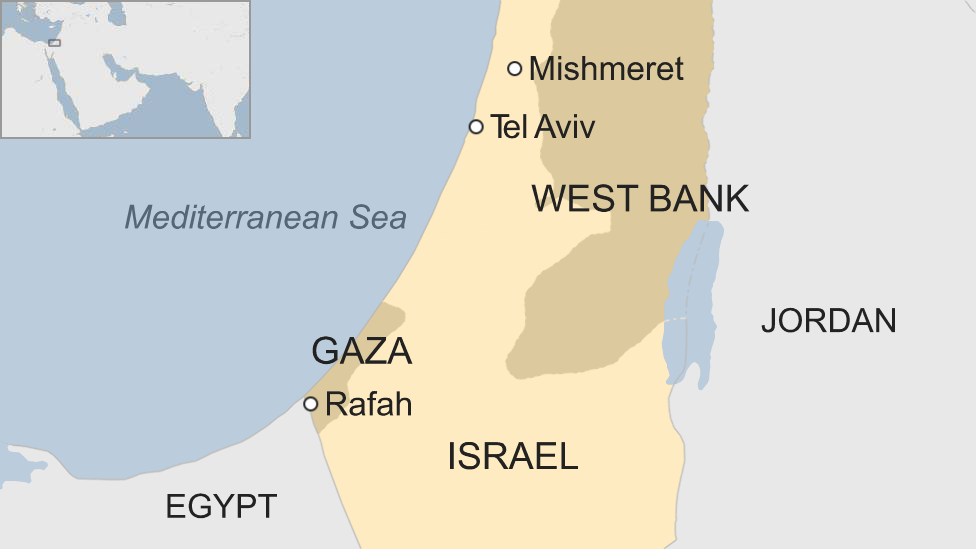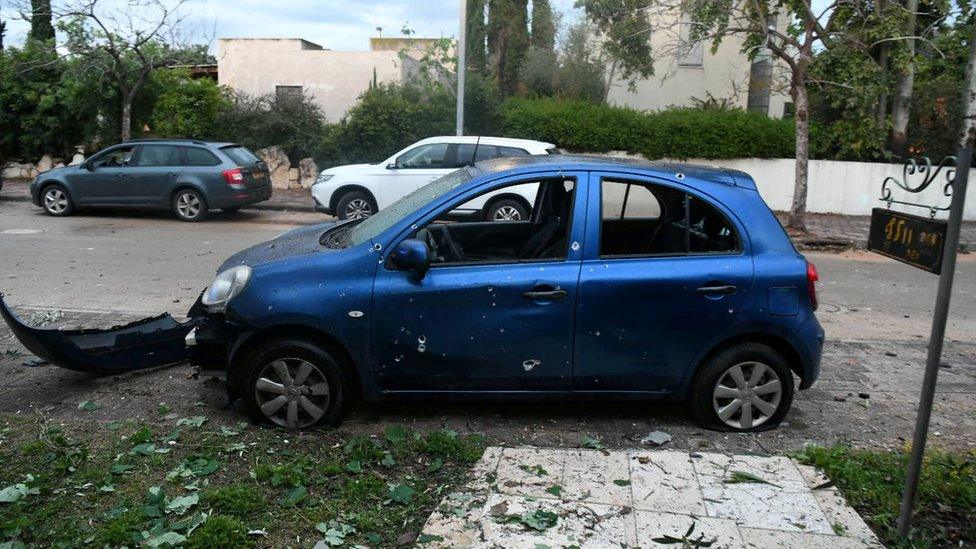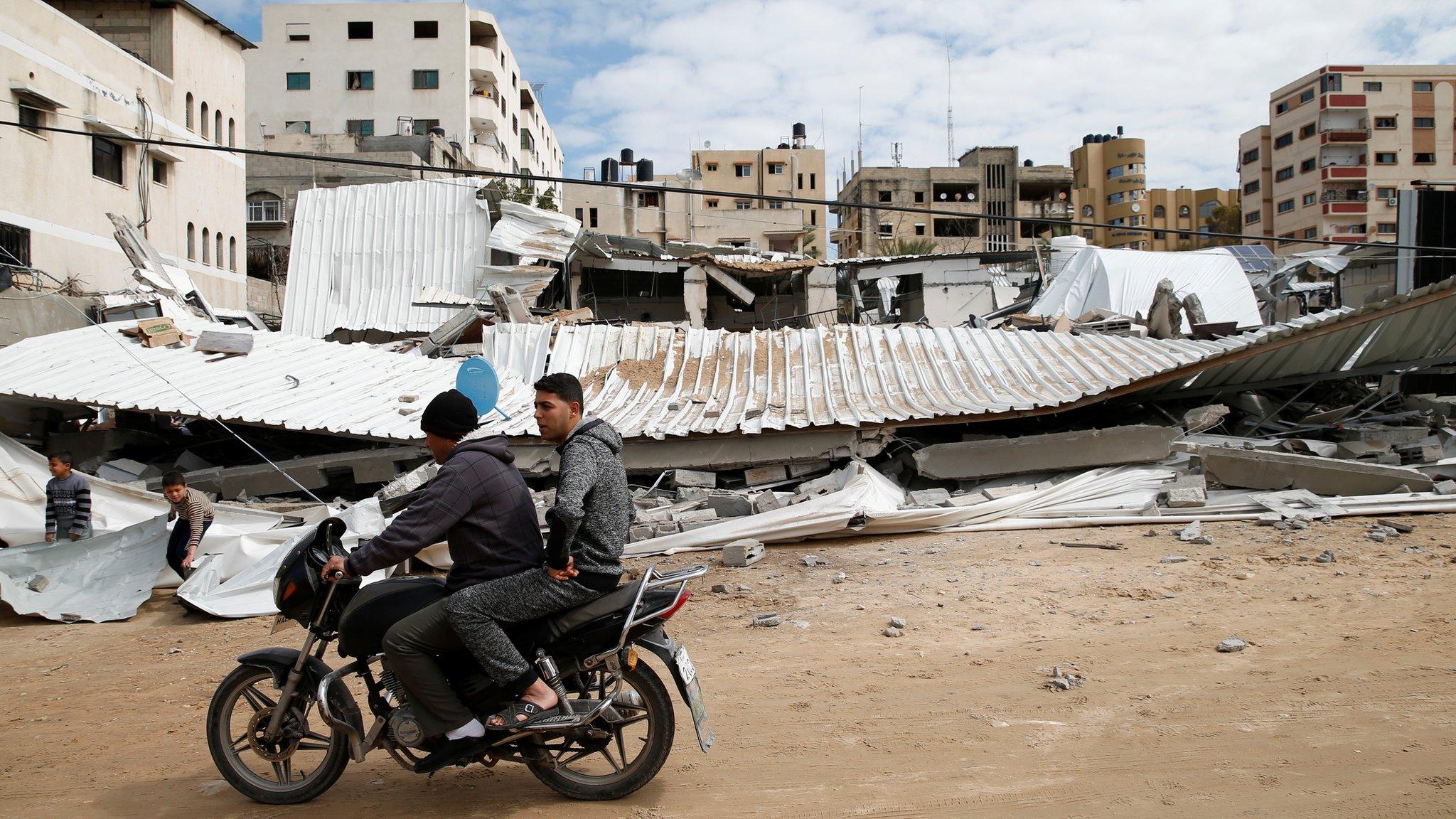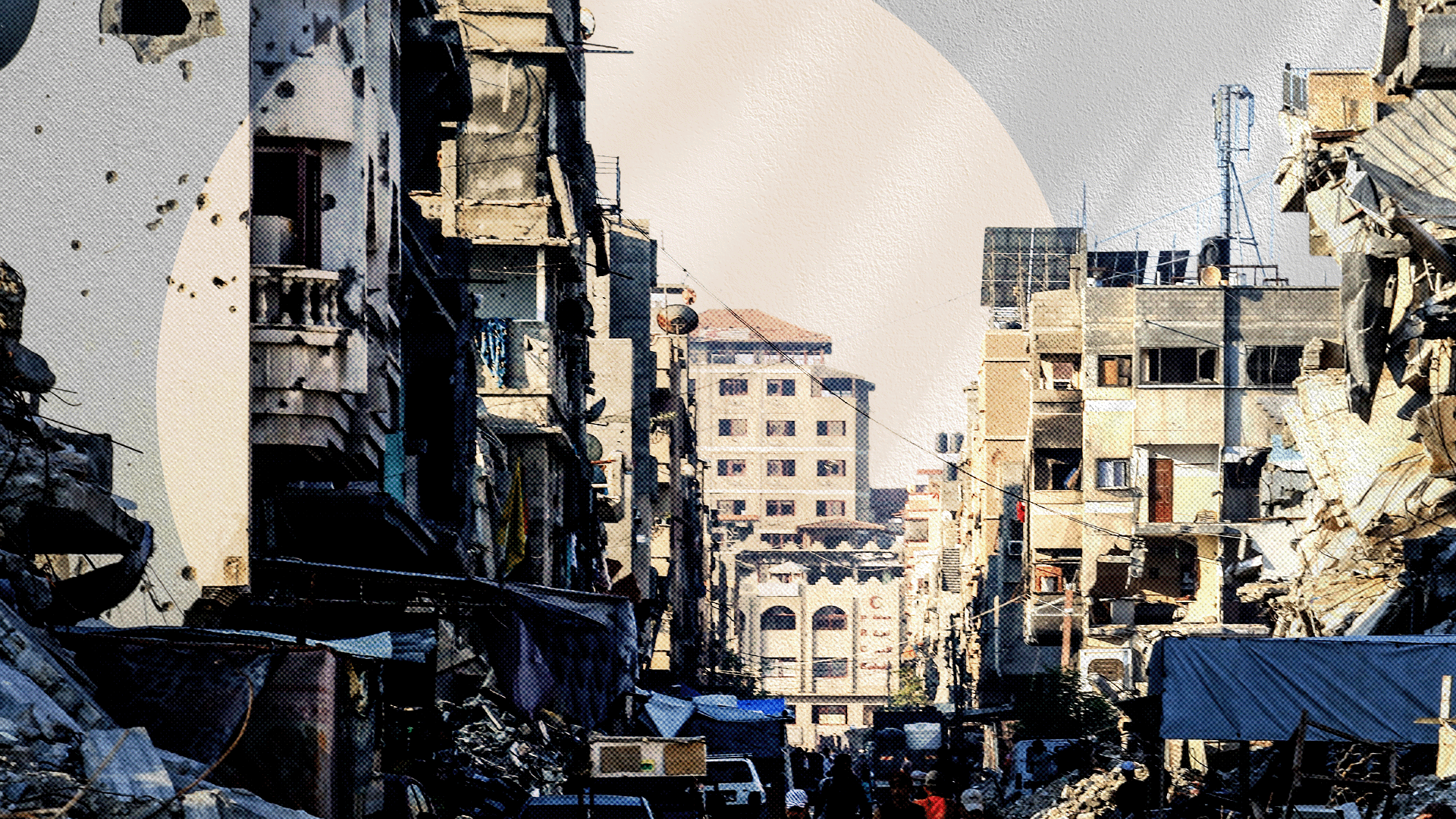Seven injured as Gaza rocket hits home in central Israel
- Published
Gaza rocket: Two children and an infant were among the injured
Seven people have been injured after a rocket fired from the Gaza Strip hit a house belonging to a British-Israeli family in central Israel.
The rocket came down at 05:25 (03:25 GMT) in the community of Mishmeret, 20km (12 miles) north of Tel Aviv.
This is the furthest a Palestinian rocket has reached in Israel since the 2014 conflict with militants in Gaza.
Prime Minister Benjamin Netanyahu cut short a trip to the US over the attack and vowed to respond with force.
So far no-one has said they carried out the attack. The Israeli military accused the militant group Hamas, which controls Gaza, but a Hamas official said it had "no interest" in doing so.
A week and a half ago, two rockets were launched towards Tel Aviv and nobody was hurt. The Israeli military responded with dozens of air strikes across Gaza, which injured four people.
Hamas and Israeli officials later said those rockets had been fired "by mistake".

What happened on Monday?
The Israel Defense Forces (IDF) said the rocket that hit the house in Mishmeret was launched from Rafah in southern Gaza, about 120km (75 miles) away.
The explosion from the rocket severely damaged the house and set it on fire.
Israel's Magen David Adom ambulance service said it had treated two women who were moderately wounded and five other people, including an infant, a three-year-old boy and a 12-year-old girl, who had minor wounds.
Allow X content?
This article contains content provided by X. We ask for your permission before anything is loaded, as they may be using cookies and other technologies. You may want to read X’s cookie policy, external and privacy policy, external before accepting. To view this content choose ‘accept and continue’.

The house belonged to Robert and Susan Wolf, two British-Israeli dual nationals who are originally from London.
Mr Wolf told the Daily Telegraph newspaper that he had been at home with his wife, son, daughter-in-law and grandchildren when the rocket hit, external.
"If we hadn't got to the bomb shelter in time I would be burying all my family," he said.
The blast also caused damage to at least one nearby home and several vehicles.
Although the rocket triggered sirens in the Sharon and Emek Hefer regions, Israel's Iron Dome missile defence system was not activated.
When asked for an explanation, an IDF spokesman told the Yedioth Ahronoth newspaper, external: "Iron Dome protects the areas in which it is stationed, according to operational situation assessments."
Intended to combat missiles launched from ranges of between 40km and 70km, each Iron Dome battery can protect an area of roughly 155 sq km.
But the BBC's defence correspondent Jonathan Marcus says there is a limited number of batteries available and they need to be deployed correctly to meet the most likely threats.
The failure to intercept this missile, he adds, is a reminder of the altogether greater challenge should Israel be engaged in a conflict on its northern borders, where the volume of Iranian and Hezbollah missiles might swamp its defensive systems.
Who was behind the attack?
IDF spokeswoman Major Mika Lifshitz blamed Hamas, which has fought three wars with Israel since 2008.
"It's a Hamas rocket, itself made by Hamas," she said. "It has an ability to reach more than 120km."
"We see Hamas as responsible for all that happens in the Gaza Strip," she added.

Cars parked near the house were damaged by fragments from the rocket
Maj Lifshitz said the IDF was deploying two additional brigades to the area surrounding Gaza, and that there was a "very limited" calling up of reservists.
The Israeli authorities have also closed the Kerem Shalom and Erez border crossings with Gaza, and closed roads and suspended agricultural work near the boundary fence with Gaza.
Prime Minister Netanyahu said in a statement: "There was a criminal attack on the State of Israel, and we will respond forcefully."
The British ambassador to Israel, David Quarrey, said there could "be no justification of any kind for this attack".
Allow X content?
This article contains content provided by X. We ask for your permission before anything is loaded, as they may be using cookies and other technologies. You may want to read X’s cookie policy, external and privacy policy, external before accepting. To view this content choose ‘accept and continue’.
Jason Greenblatt, the US special representative for international negotiations, wrote on Twitter, external: "We condemn this violence from Gaza and affirm Israel's right to defend itself."
Hamas has not commented on the attack publicly, but an unnamed official told AFP news agency that "no-one from the resistance movements, including Hamas, has an interest in firing rockets from the Gaza Strip towards the enemy".
The Times of Israel reported that the Hamas-run interior ministry in Gaza had launched an investigation, external to determine who was behind the rocket launch.
Islamic Jihad, another militant group, warned Israel against retaliatory strikes. "[Its] leaders must know that we will respond forcefully to their aggression," he said.

Could the situation escalate?

The timing of this rocket launch comes at a very sensitive time.
The Israeli prime minister is fighting a close election campaign in which he is brandishing his security credentials. He had just arrived in Washington, where he was due to meet President Trump twice and give a speech.
He will now go once to the White House and then says he will return home "to manage our actions from close at hand".
Already fears of an escalation were high with this week's anniversary of the start of protests at Gaza's boundary fence with Israel.
Egyptian security officials - who've been trying to broker a longer-term ceasefire between Israel and Hamas - were due in Gaza this morning. Now, their efforts to bring quiet are in jeopardy.
- Published15 March 2019

- Published16 January
